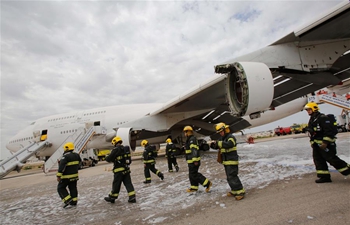
People watch the news broadcast on U.S. withdrawal from the Iran nuclear deal at a teahouse in central Tehran, capital of Iran, on May 8, 2018. U.S. President Donald Trump said on Tuesday that he will withdraw the United States from the Iran nuclear deal, a landmark international agreement signed in 2015. (Xinhua/Ahmad Halabisaz)
CAIRO, May 8 (Xinhua) -- The U.S. decision to withdraw from the Iran nuclear deal has sparked mixed opinions in the Middle East region, with some countries condemning the move to cause instability while some supporting the announcement.
U.S. President Donald Trump on Tuesday announced to leave the Joint Comprehensive Plan of Action (JCPOA) and said he will impose sanctions on Iran.
Immediately after Trump's announcement, many countries condemned the move as they said the U.S. move threatens regional peace and pushes the region to the edge of war.
Iran's President Hassan Rouhani said that the Islamic republic will remain in the nuclear deal with other JCPOA signatories without the United States.
"From this time on, the nuclear deal is an accord between Iran and five countries," Rouhani said in live speech broadcast from state TV.
Iran proved that it has been committed to its international obligations, Rouhani said, adding that the United States has never been bound to its nuclear deal obligations since it was implemented in January 2016.
Rouhani said that he has asked the Iranian foreign minister to initiate negotiations with the European partners as well as China and Russia over the measures regarding the fate of the deal.
He also said that the Atomic Energy Organization of Iran (AEOI) will resume the industrial uranium enrichment at any level if the upcoming negotiations do not save Iran's interests guaranteed in the JCPOA.
"Since now, we should examine how the remaining big powers in the accord would deal with it," Rouhani said, adding that "if the deal remains live, we can take steps for the world's peace and security."
Syria's Foreign Ministry also condemned the U.S. decision to withdraw from the deal.
It said the international reactions that condemned the U.S. withdrawal from the deal prove the "international isolation" of the United States and its mistaken policies that would increase the tension in the region and the world.
It added that the U.S. move proves again the lack of credibility and commitment by the U.S. to the international agreements.
The ministry stressed the Syrian government's full solidarity with Iran and voiced confidence in the Iranian ability to surpass the repercussions of the U.S. stance, "which affects the security and stability in the region and the world."
Upon the U.S. decision, Turkish Presidential Spokesperson Ibrahim Kalin criticized that the unilateral move would bring to the region instability and new conflicts.
On his Twitter account, Kalin said the multilateral Iran nuclear deal will continue thanks to the other countries' participation.
Turkish Economy Minister Nihat Zeybekci told CNN Turk broadcaster that Turkey will continue its trade with Iran within a possible framework.
Meanwhile, Israel and some Arab Gulf states expressed support for Trump's decision to pull the U.S. out of the landmark pact.
Israeli Prime Minister Benjamin Netanyahu hailed U.S. move as a "courageous" and "right" decision.
Netanyahu accused Iran of preparing to attack Israel. "For the past months, Iran has been transferring weapons to its forces in Syria," he said in a televised statement.
"We will react with force to any attack," he said. "The army is prepared, the army is strong, and whoever will try us will feel well the strength of our arm," he warned.
The prime minister called on the international community to join the United States and revoke the landmark deal. He also called other countries to act against "the Iranian aggression."
According to Netanyahu, the deal would have enabled Iran to enrich uranium "in quantities sufficient to produce a whole arsenal of nuclear bombs."
Saudi Arabia highlighted in a statement through Saudi Press Agency that it also welcomed re-imposing sanctions on Iran that were suspended after the enforcement of the deal.
It said the kingdom had supported the deal between Iran and other six powers at the beginning to limit the proliferation of weapons of mass destruction in the Middle East and the world, but Iran exploited the economic gains of the deal to destabilize the region.
Saudi Arabia asserted its continuation to work with the United States and other world partners to tackle the threats of the Iranian policies on international security and peace.
The United Arab Emirates (UAE) also announced its support to the U.S. decision to withdraw from the Iran nuclear deal.
The country called on international community and the other states that are parties to the agreement to support the U.S. stance.















